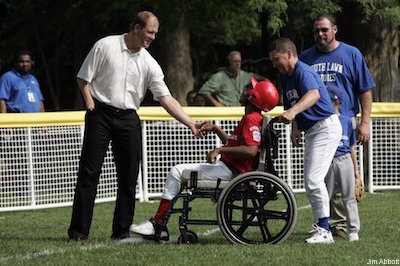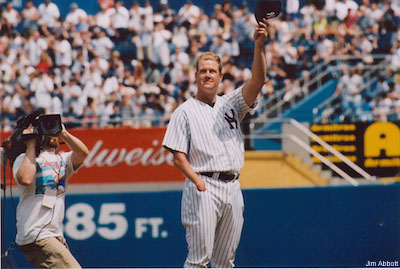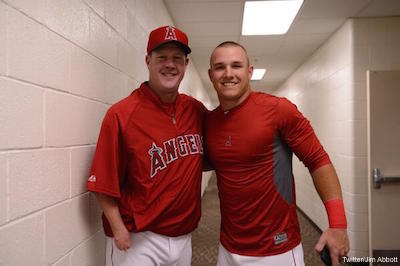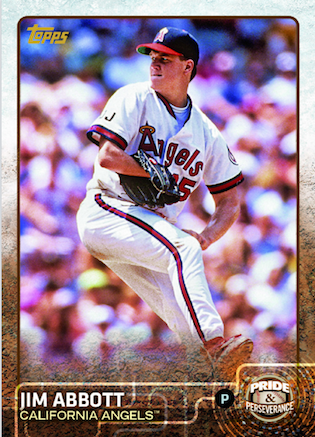Jim Abbott is doing some media rounds for Topps. He is not getting any money but participates because it feels right. Abbott is one of the faces of the "Pride & Perseverance" set, celebrating past and present major leaguers who have overcome challenges.
Abbott overcame quite a challenge. He was born without a right hand.
"If they would have come to me early in my career with the idea for this card set, I don't know if I would have been comfortable with it," Abbott says. "I didn't want that label."
Abbott, 48, pitched his way through the University of Michigan and 10 seasons in the majors, posting a 4.25 ERA, 87 wins and 888 strikeouts. He used a custom glove he would slip on and off his lone hand.
Abbott will not be remembered for his stats as much as his improbably athletic success.
"Now that I'm older, I understand the power and acceptance of saying listen, my hand may have presented challenges to me, but it also gave me a lot," Abbott says. "It presented a drive and an ambition. It's who I am and I don't think I'd be where I am without it."
It is amazing Abbott even played sports from the beginning, let alone turned into a professional. Growing up in Flint, Michigan, Abbott says family and friends could have stopped him from believing he could actually become a pitcher without a hand. They could have saved him the hardships.
"Honestly, I went through a lot of times of insecurity and self-doubt," Abbott says about his childhood. "It was my parents, my coaches and teachers, literally pulling me to the side and saying you can do this. My parents never guided me towards something that may have made more sense, like something you didn't need two hands to do. It was that sort of attitude. If you want to do it, we'll find a different way. We'll work on switching the glove on and off. We'll hold the bat a different way."
In the majors, Abbott earned similar respect. He started his career with a 3.92 ERA in his 1989 rookie year, good for fifth in the AL Rookie of the Year Award voting. His success on the field gave him admiration from his peers, along with the occasional jokes.

"There was a little bit of teasing," he says. "You walk into a major league clubhouse, someone's going to tease you about anything whether it's glasses, you're a lefty or a righty."
As long as Abbott's teammates were the only ones teasing him, he was fine with it, and so were they. When others chirped Abbott's disability, the tide turned. Abbott remembers one such incident at the old Comiskey Park.
"There was this big bench-clearing brawl and some fan yelled from the stands, 'Abbott, how you gonna fight with one hand?'" Abbott says with a laugh. "About half my team stopped. Doug Rader, our manager, I thought he was going to go into the stands at this guy. The attention went from the Chicago White Sox to this guy in the stands."
Even when Abbott proved he could handle MLB hitters, it was difficult to escape his reputation as the guy with one hand. Abbott's disability, for good reason, was a form of inspiration, but it was also a social barrier.
That all changed on Sept. 4, 1993, when Abbott, then with the Yankees, tossed a no-hitter against the Cleveland Indians.

"To have that one moment, particularly playing for the Yankees, which, whether you love the Yankees or hate the Yankees, it's still an incredible place to play, and if you have a game like that, people know about it," Abbott says. "I'm proud of that game for the memory of it with my teammates, but it's something that people look to. If there's a young kid that looks at it and says this guy pitched with one hand and threw a no-hitter at Yankee Stadium, what's possible for me? I think that's a great story."
The no-hitter narrowly predated the Yankees-Indians rivalry of the 1990s (every AL pennant from 1995-2001 was won by one of the two teams). Abbott had Don Mattingly, Wade Boggs, Paul O'Neill and Bernie Williams in his lineup. From the other dugout came names like Jim Thome (who played third base), Kenny Lofton, Carlos Baerga and Albert Belle.
Oh, and a September call-up named Manny Ramirez. Ramirez had gone 3-for-4 the previous night with his first two career home runs. Abbott's no-hitter was Ramirez's third MLB game.
"We saw him as a kind of free swinging, big kid," Abbott says. "He certainly had a reputation already. He was from that area, so he had a huge contingent of fans who showed up down the left field line. We knew about him, but we didn't know a lot of how to pitch to him."

Ramirez hit one ball hard, but Abbott remembers shortstop Randy Velarde flashing the leather and turning a double play.
Since 1993, the no-hitter made Abbott's story all the more remarkable.
"I'm amazed that so many people remember it and talk about it," Abbott says. "It was a great day and hopefully there's more to it than just 27 outs without anyone getting a base hit."
Abbott's new life includes some baseball. He lives in Southern California and works with the Angels on an informal basis (he has an open invitation to Spring Training as a coach). But Abbott is finding his calling off the field, back to where things started -- overcoming disabilities. He tells his story to kids, most born after his retirement. He spends most days in his home, responding to letters, emails, texts and tweets he gets from fans.
"I hate the two words: Motivational speaker," he says. "But I do have an opportunity to travel around the country and talk to large groups of people about my career and the lessons I learned and growing up differently.
"I've become a lot more comfortable in my skin than I was when I was playing."
Topps' "Pride & Perseverance"set includes such current major leaguers such as Jon Lester and Anthony Rizzo, both cancer survivors, Jake Peavy, who is legally blind without corrective lens and George Springer, who has overcome stuttering.
"As a kid who collected cards, I feel it would have made a big impact on me," Abbott says. "I didn't know a lot of stories about people who had overcome a disabilities.
"For a kid who may not have a physical challenge, I think it creates great awareness and hopefully acceptance."
Imagine being a kid trying to open a pack of baseball cards with one hand. That is what Abbott had to do every time.
Now, imagine that same kid became a major league pitcher. He did all right for himself, and now, he is inspiring others to match his perseverance.
-- Follow Jeffrey Eisenband on Twitter @JeffEisenband.






